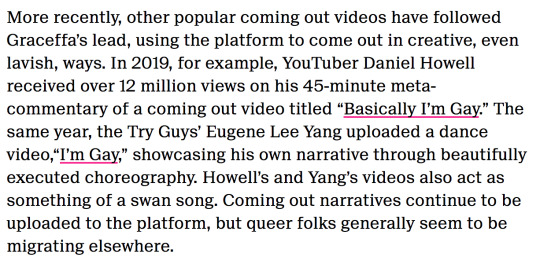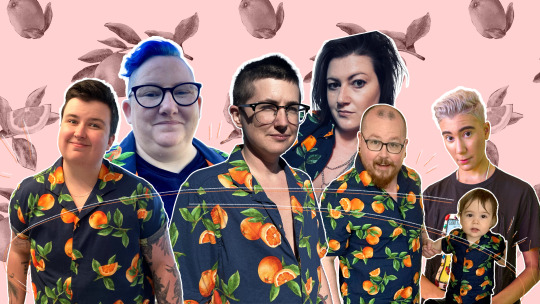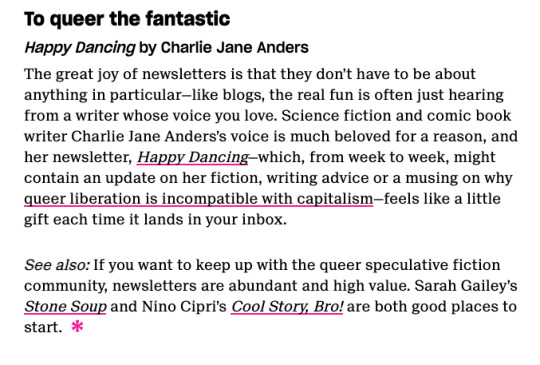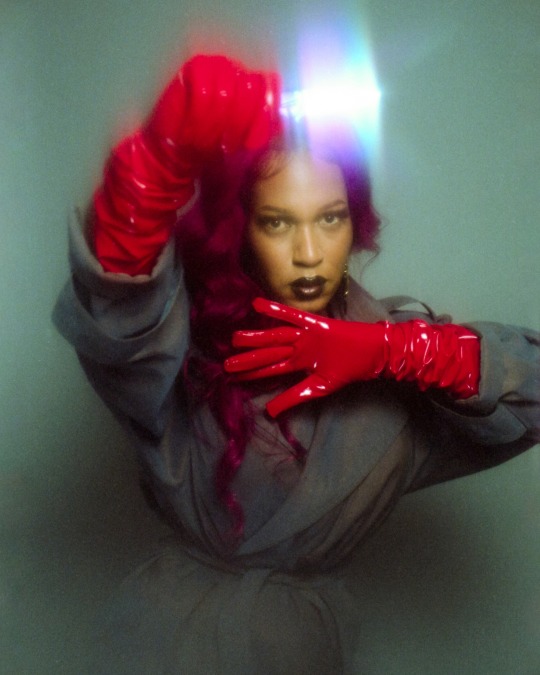#xtra magazine
Text

dan/BIG mentioned in an article about how coming out has shifted platforms over the years
4 notes
·
View notes
Text
https://xtramagazine.com/uncategorized/privilege-conflict-236673 OK I honestly hate this advice column answer, and feel it is leading to some toxic places. I wrote a goddamn essay of a comment which I will put under the cut, just because I think it’s important. Without going into too much detail, this is quite close to home for me. Tumblr keeps giving me ads for xtra magazine but this is the first time I clicked in and I’m going to hide the ads now, I’m not a fan and it’s not for me.
My response, which I ended up needing 4 comments for:
1. I find this advice quite troubling, and there are many things that go unaddressed. For example, OP's reason for drifting during the pandemic was a very clear one: they had their first child. If the friend in question is childless, then this becomes the age old question (which disappointingly is not addressed AT ALL by Kai)- how does the friend who newly has children stay connected with their childless friends? If OP is a women, which the friend's comments suggests, she is likely to be doing much more than 50% of the childcare. I have not experienced this conflict in my own life yet but I have seen it discussed many times and both sides have reasonable grievances: the childless friends feel the friend with the new baby never has time for non baby related things any more, a lot of things such as evening events may be totally out for a while, and if meeting up the baby may have to come too a lot of the time which can be disruptive and a big change for the friendship. The friend with the child feels the childless friend doesn't understand the problems of always having to find childcare in order to do things, etc, and feels the childless friend thinks they are turning down too many invitations and it means they no longer want to be friends. Neither's feelings are wrong, but the fact that the child needs care will not change, and it will be a good long time before the child is old enough for childcare needs to not be a factor. This will always affect how much time the new parent has for their friends. Now, I know we don't actually know from this whether the friend has children, it is not mentioned. But from the information we do have, the fact the the OP needs to spend a lot of time doing childcare and this is unchangeable fact should be acknowledged.
2. The main thrust of this advice is that the OP is somehow looking at their conflict in an overly white way. I understand why Kai wrote it this way, because it's kind of a right wing talking point, that people of colour will manipulate using their race and you can just ignore it. This is of course gross and no one would want to imply this. I do not think the OP wants to imply this and I think OP is already pretty aware of these dynamics. However, reading this you might think that friendships between white people and people of colour (or between a more marginilised and a more privileged person) could never, ever work. Despite the protestations to the contrary, I think this advice encourages an unhealthy amount of eggshell walking.
The truth is the friend of the OP is hurting, and feels she has not been supported by the OP in her bereavements that happened during the height of the pandemic. Her feelings have gone unexpressed for a long time and have built. In one way the OP can never truly make up for this because she can't go back in time and be there for her friend during those times. Listening to the friend's grievances is difficult for her because they become very emotionally charged. Whether or not OP subconsciously is experiencing this as more difficult because the friend is a woman of colour, the outcome is the same, and OP will not improve anything by being a space for her friend to vent into. I fundamentally do not want the OP to get the impression from the advice given that it would be at all useful for them to attempt this, or that it would be a good thing for social justice or their duty as a white person.
3. I feel that Kai could have suggested something like: maybe the OP asks her friend to write her a letter, expressing all her feelings, and that she will read it and reply, also in a text medium. Sometimes text is easier when emotions run high. I don't know, maybe this is a very privileged suggestion of me or something, but it is clear that the OP crying and the friend shouting is not working for either of them. (Also re: crying- as a former constant crier who is now on the right meds and doesn't any more, I do NOT argue with the idea that my tears could leverage oppression against people of colour, and it doesn't matter what the reason for it is for that to happen, but......involuntary tears are for the most part treated as unprofessional in workplace scenarios, and embarrassing for all in the room. It can really suck, and OP I feel for you on that count. 2nd assurance that I'm well aware there are scenarios where tears from a white person could manipulate racial hatred, including if the tears are involuntary! Good thing I do not do it any more, this is a constant relief to me. Anyway..) The implication that white, middle class people are uncomfortable with yelling and plain speaking in interpersonal conflict is very strange to me. They may be uncomfortable with this in certain scenarios, but trust me my white middle class parents were perfectly fine with yelling at their kids. I don't know the OP's class background, but it sounds like her white parents liked to yell too. I understand the need to emphasise that yelling is not the worst thing that can happen, and that the friend may experience the OP's request for no yelling or swearing as a function of their white privilege. However I STILL don't think this was a boundary that was wrong for OP to try to set.
4. OP, please do not feel that the only 'right' thing in this scenario is for you to continue being friends, your friend is angry about you being out of touch when you needed her, and you will never truly be able to make it right but you must keep trying. This dynamic would be incredibly toxic for both you and your friend. I do think a sincerely expressed apology that expresses the facts without excuses would be a good thing if you haven't already sent one: 'friend, I am sorry I wasn't there for you when you really needed me. I regret this very much and I know you're still hurting. I really care about you and really want you to continue to be in my life.' Stick to the facts and don't self flagellate- despite what columns like this one suggest, people do not really want this. Do it via a text medium as it can be easier if things are becoming very emotional. It's not a solution, your friendship may still not survive in the end, but you will have said the truth of how you feel about your friend. From there, resist any attempt by your friend to bring you into a cylce of you listening to venting and becoming upset. This will not lead ANYWHERE good. You suffering does not help marginilised people.
Relationships across privilege dynamics always need to have awareness, tact and self reflection from the more privileged person, but I honestly feel that when the 2 people become nothing more than those two roles, one oppressor and one oppress-ee, the friendship cannot survive. The theories your friend is using as a framework are real, but they are about overall dynamics and systems, and things will always be affected by more factors with two individual humans and how they relate to each other.
Good luck, and my love to both you and your friend. ��
#xtra magazine#advice column#friendship#privilege dynamics#guilt studies#shoutout to tributary for that term
2 notes
·
View notes
Text

Oranges are literally the only fruit
How the Old Navy orange-print button-up became the queer uniform of summer 2022
4 notes
·
View notes
Text
This is Roz Kaveney. We've been friends since 1985, and I can attest that she's been on the right side of history. I learned so much from her:
You should read this article. (And if you do, post your favourite quote or thing you learned from it...)
2K notes
·
View notes
Text
In the 1970s, some gay community leaders turned their backs on the “less respectable” (read: trans, gender-weird, drag-performing, poor, racialized and/or flaming) members of their community in a cynical ploy to gain acceptance and power for themselves—at the expense of their more marginalized peers. There’s no better example than when, in 1973, the New York Pride Committee tried to bar trailblazing trans women of colour Marsha P. Johnson and Sylvia Rivera from participating in the Pride parade because they were giving the organization “a bad name.” This decision by the local Pride committee exemplified a broader trend where some gay activists sought to push out more marginalized community members to win respectability and influence.
Flash forward 50 years and history is repeating itself in Canadian politics. As anti-LGBTQ2S+ hate rises across Canada, with even CSIS sounding the alarm, and trans lives being used as a political punching bag by far-right groups, Melissa Lantsman and Eric Duncan, the two (and only two) openly gay Conservative MPs, and other Conservative MPs who’ve called themselves our allies, are turning their backs on LGBTQ2S+ rights.
Continue Reading
Tagging @politicsofcanada
172 notes
·
View notes
Text
What went wrong at the New York Times? | Xtra Magazine
OPINION: The paper of record is under fire for its transphobic coverage. How did it get this bad, and who is calling the shots?
750 notes
·
View notes
Text
What better start to the weekend than to read an excerpt from the new book Gender/Fucking: The Pleasures and Politics of Living in a Gendered Body?
Get your copy now!
#transgender#lgbtq#trans#lgbtqia#queer#gay#lesbian#lgbt#books#trans lit#nonbinary#non binary#nonfiction#booklover#books and reading#bookish#bookworm#new books#booklr#bookblr#book quotes
93 notes
·
View notes
Text
Not a book recommendation this time, but an essay recommendation that leads to book recommendations! I've found and really enjoyed this essay about trans literature with an overview of some important voices in the genre and I just wanted to share this here in case anyone is interested in checking it out as well.
#not a poll#book recommendations#trans literature#trans books#so ive heard of 20 of the 27 authors mentioned here but ive only read books by 9 & that needs to be remedied asap#a few i only knew bc im running this blog! it is hard to find trans authors and trans literature but its out there#and i love love love discovering more and more and more#but i remember sadly googling trans authors for the 20th time and only finding the same authors over and over and over#and if theres one thing i hope this blog is good for its showing that there are so many more trans books and trans authors out there!#mod post
54 notes
·
View notes
Text
"digital libraries like QLL are a lifeline to queer and trans people who may want to browse away from prying eyes"
-Adam Rhodes, Queer libraries are on the front lines of the fight against book bans. Xtra Magazine
46 notes
·
View notes
Text

Thanks so much to @judedoyle for writing such kind words about my newsletter Happy Dancing (https://buttondown.email/charliejane) in Xtra Magazine. This made me do a happy dance for real! http://tinyurl.com/4yvvrssz
31 notes
·
View notes
Text
Over at Xtra, I wrote an analysis of how the US media took a hard-right turn just in time for 2024. Featuring: The NYT! Substack! X-Twitter! The weird Hitlery dude who funded both Substack and Elon's takeover of Twitter! A real cavalcade of stars here.
#media#trans rights#perfect storms#weird vc guys who think communism is the only thing between them and mars
19 notes
·
View notes
Text
LUNCH WITH JAN WONG
To speak or not to speak, that is
the question for Stratford's BrentCarver.
JAN WONG
Saturday, July 1, 2000
Brent Carver is shy, so shy that when you start asking questions, he stops eating lunch. Sometimes he stops talking altogether. "Some people think silence is golden," says Carver, 48, after one particularly excruciating pause.
On stage, the actor is a fountain of eloquence. He's worked in every major Canadian theatre. He won a Tony in 1993 for his work on Broadway. At Stratford this summer, he's starring in two productions, Fiddler on the Roof and Elizabeth Rex,a Timothy Findley play that premiered Thursday.
But take away his script and ask him about himself or, say, Garth Drabinsky. Then there are only half-sentences, long stares and silence, lots of silence.
Carver is a vegetarian. He normally has a bowl of oatmeal or Red River cereal for breakfast. But at this brunch at Stratford's elegant Church Restaurant, he fortifies himself with salmon cakes and apple slaw to make it through the day's rehearsal -- and this interview.
In Elizabeth Rex, about a meeting between Shakespeare and Elizabeth I, he plays an actor specializing in female roles. Carver often takes on gender-bending parts. He won the Tony for his portrayal of Molina, the flamboyant gay window dresser in Kiss of the Spider Woman. Time magazine said that his performance "far surpasses" William Hurt's 1985 Oscar-winning version.
But ask Carver about the influence his own life has had on these roles, and an awkward silence ensues. For someone whose day (and night) job is performing before a live paying audience, he's paralyzed one on one. In 40 articles about him, including two promisingly headlined "A Personal Profile" and "A Frank Conversation," there's scant information. Not one mentions whether he's married, single, divorced or living with anyone. Only one says he has a cat named Licorice.
At lunch, Carver admits to having a cat named Licorice. He also acknowledges having a tiny home in nearby Niagara-on-the-Lake. He won't say more. As for his temporary digs in Stratford, he says, "I'm living alone here." He imbues "here" with all the significance a great actor can muster. Does that mean he doesn't live alone over there in Niagara-on-the-Lake?
"I won't talk about my personal life, particularly when we witness across America the intrusion . . . ." His voice trails off. He looks down. "I have nothing to sell. What I do is I'm an actor. My home is found in the theatre."
Jeez. You'd think I was asking if he was gay. Actually, I am. And he is. But he's uncomfortable talking about it, even in this age of record-setting gay pride parades. You feel as though you're dragging him out of the closet. Yet he's not in the closet. Carver has talked, sort of, about his homosexuality in Xtra! He told the gay bi-weekly he feels "a part of the gay community." But even Xtra! elicited nothing more than the fact that in 1995 he was single and sharing his house with an ex-lover.
"I have no children," he says at lunch, daring you to read more into it. Then he looks down again at his lap. He pushes away his plate. He sips some Red Rose tea.
"Not many people ask me who I actually am," he says slowly. "As Shakespeare says in Hamlet, 'What ultimately is plucking out the heart of one's life?' Do we actually think that's going to illuminate who we are? Say what is our existence on earth?"
He played Hamlet 16 years ago. The exact quote is: You would pluck out the heart of my mystery; You would sound me from my lowest note to the top of my compass: And there is much music, excellent voice, in this little organ; yet cannot you make it speak.
Shakespeare was right. In Carver, there is much music, excellent voice. Yet you cannot make him speak. In the long edgy silence that follows, the actor stares at the oak table. He carefully delineates segments of it with the edges of his hands. He does not look up.
His fingers are long and white, like the rest of his body. At 5 foot 11 and 158 pounds, he looks like a graduate student in his tan plaid shirt, red backpack and 32-inch waist jeans. His lean look suits both his current roles. In Fiddler, he plays Tevye, a gaunt Russian peasant in the midst of a czarist pogrom. In Elizabeth Rex, he's a Shakespearean actor dying of the pox.
Carver was born in Cranbrook, B.C., the fourth of eight children. His mother was a clerk at Woolworth's. His father, who loved music, drove a logging truck. Carver loved music, too. "My uncle remembers me singing things from the radio before I could talk," he says.
At seven, he earned money singing at weddings. He also sang for the Lions Club and the school choir. The choir stuff, and his blond ringlets, made him a prime target. Neighbourhood bullies beat him in Grade 1. They threw snowballs in his eyes. "I used to make sure my older brother would walk me home from school," Carver recalls.
As Tevye, the beleaguered father of five headstrong daughters, he spends virtually the entire two hours and 45 minutes on stage. He also sings and dances to 14 songs. After one matinee, Carver leaned in exhaustion against the backstage wall, before emerging to acknowledge a standing ovation.
With Elizabeth Rex up and running too, he'll have up to seven shows a week. On 13 gruelling days, he'll perform both Fiddler and Elizabeth Rex. On those days, he says, he'll steal a nap between removing his matinee makeup and applying new makeup for the evening. "It's essential to lie down, put on music -- Leonard Cohen, Joni Mitchell, Mozart."
Since he won't talk about himself, perhaps he'll talk about why he won't talk. Asked if questions make him nervous, Carver segments out more sections of the oak table with his long fingers. He says he's always talked in fits and starts. "I start talking." He pauses. "That's not quite what I think, so I edit."
After high school, where he was valedictorian, he enrolled in theatre studies at the University of British Columbia. Three years later, he dropped out to act in movies, television and the theatre. In 1984, after working in four movies in a row, he abruptly withdrew from acting for eight months. "I just needed to not work," he says.
His most famous withdrawal came after winning the Tony. He was the toast of Broadway. Barbra Streisand came backstage to visit. But he quit three months later. His contract for Kiss of the Spider Woman gave him an escape clause, and he grabbed it. "Some people can go for three or four years. I'm just not made that way."
Livent asked him to reconsider. He did, and still said no. As for Drabinsky, Carver hasn't seen or spoken to him since Livent went kaput. He says he isn't owed any money and had a "terrific working relationship" with Drabinsky. He won't say more.
Most actors would have tried to parlay the Tony into a career in Hollywood. Instead, Carver went to Edmonton, where he played Cyrano de Bergerac at the Citadel Theatre. "I didn't leave Broadway specifically to go to Edmonton," he says defensively.
His withdrawal is more understandable if you know that one of his best friends died a year and a half earlier -- in a fire at Carver's Stratford house. (He was out of town at the time.) Susan Wright, the Canadian actress, died on Dec. 29, 1991, along with her parents. It was Wright who had urged him to take on the role in Kiss of the Spider Woman. When he won the Tony, he dedicated it to her.
At lunch, the salmon cakes are still uneaten, but Carver has to rush off to a rehearsal. He looks relieved. Soon he'll be able to speak lines somebody else wrote. He gets up, shakes hands and slings his backpack over his shoulder. He says he's really enjoyed lunch. Carver is a great actor, but not that great.
10 notes
·
View notes
Text
Reading this article and it’s a very interesting read so far! If y’all have any more books/articles about trans man activists please send them to me I’d love to read them.
https://xtramagazine.com/culture/books/jamison-green-trans-visibility-263476
8 notes
·
View notes
Text
"As a person of colour myself who is not mixed race, my own “take” is a blend of the two perspectives described above. I believe that white-passing folks of colour do experience both racism and some aspects of white privilege. As a result, I believe that white-passing people of colour can and do belong in the antiracist movement. However, I also believe that the people centred in antiracist activism should be those most likely to experience severe racist harm and violence: folks who are likely to be stopped and profiled on the street, imprisoned or killed by the state or denied access to essential resources for life—most often people who are visibly racialized, particularly Black and Indigenous folks."
9 notes
·
View notes
Text

'Elle Barbara has mastered the art of DIY glamour. Since her origins in the Montreal music scene at the turn of the 2010s, the multidisciplinary artist has dazzled with whatever is at her disposal. Whether filming videos on a shoestring budget or releasing her music on small local labels, she has maintained punk principles while looking and sounding like a subterranean pop star.' - Xtra Magazine (x)
30 notes
·
View notes
Text
Melissa Lantsman’s and Eric Duncan’s refusals to call out their party’s transphobia is a betrayal of the LGBTQ2S+ community.
83 notes
·
View notes